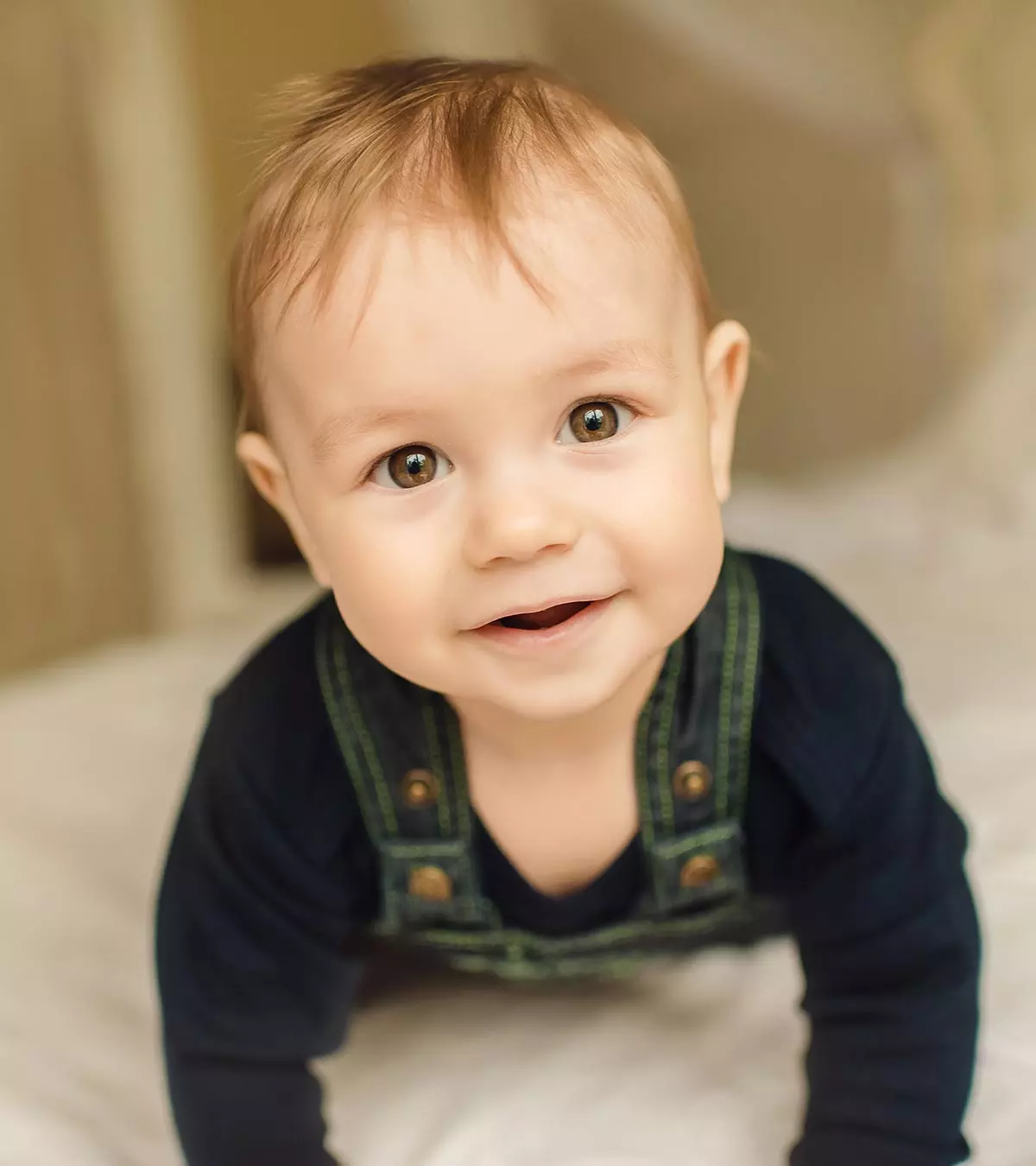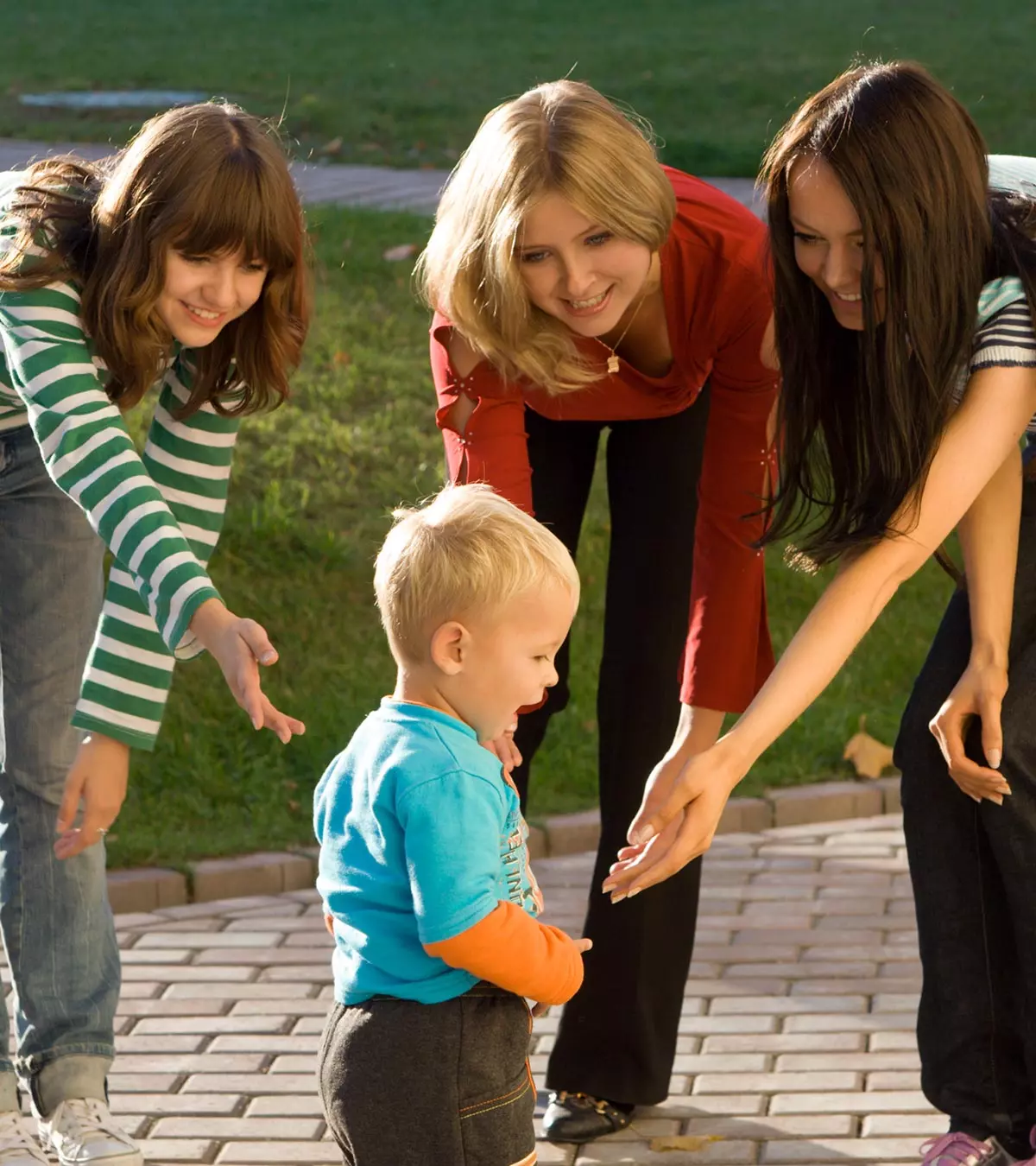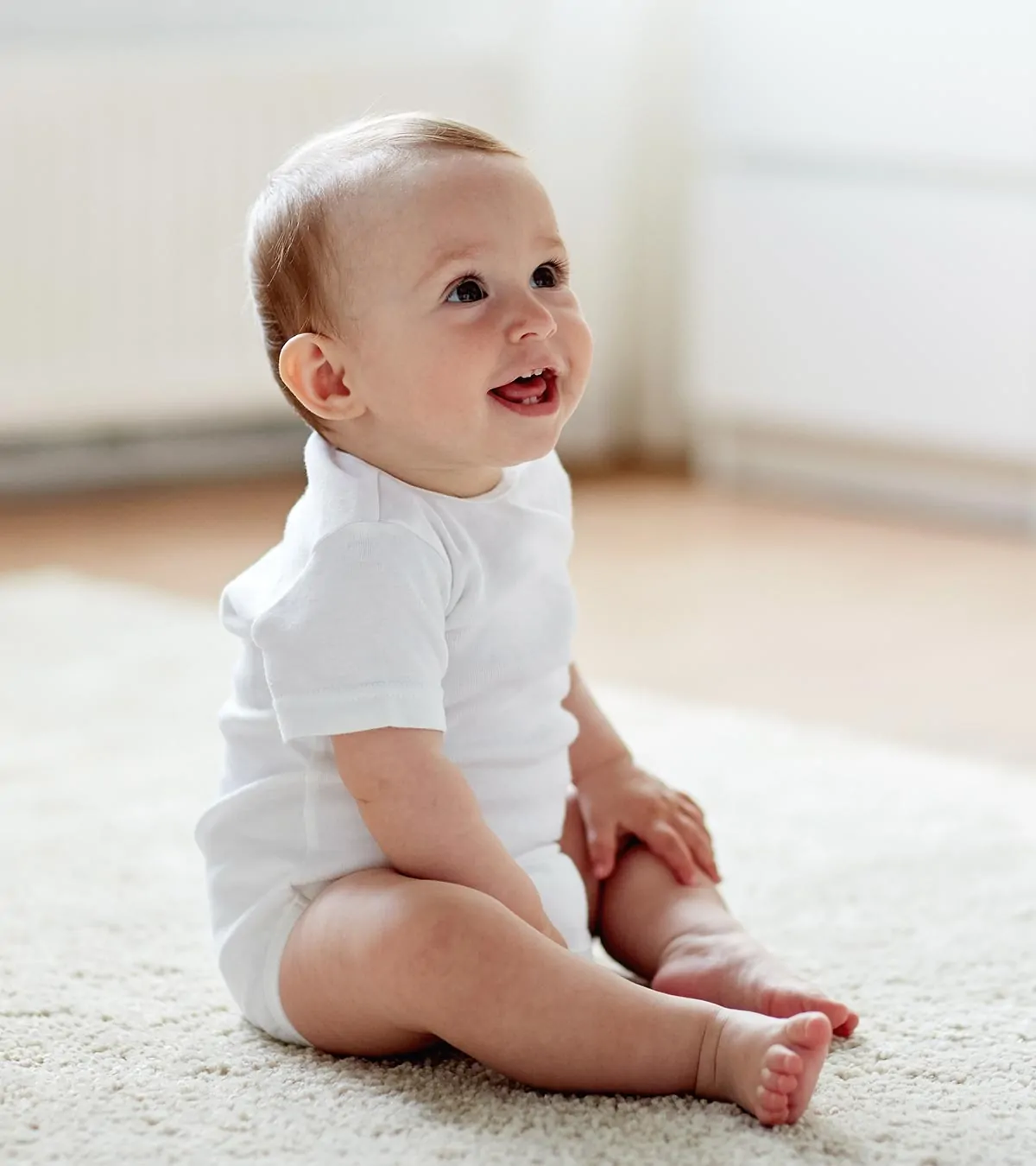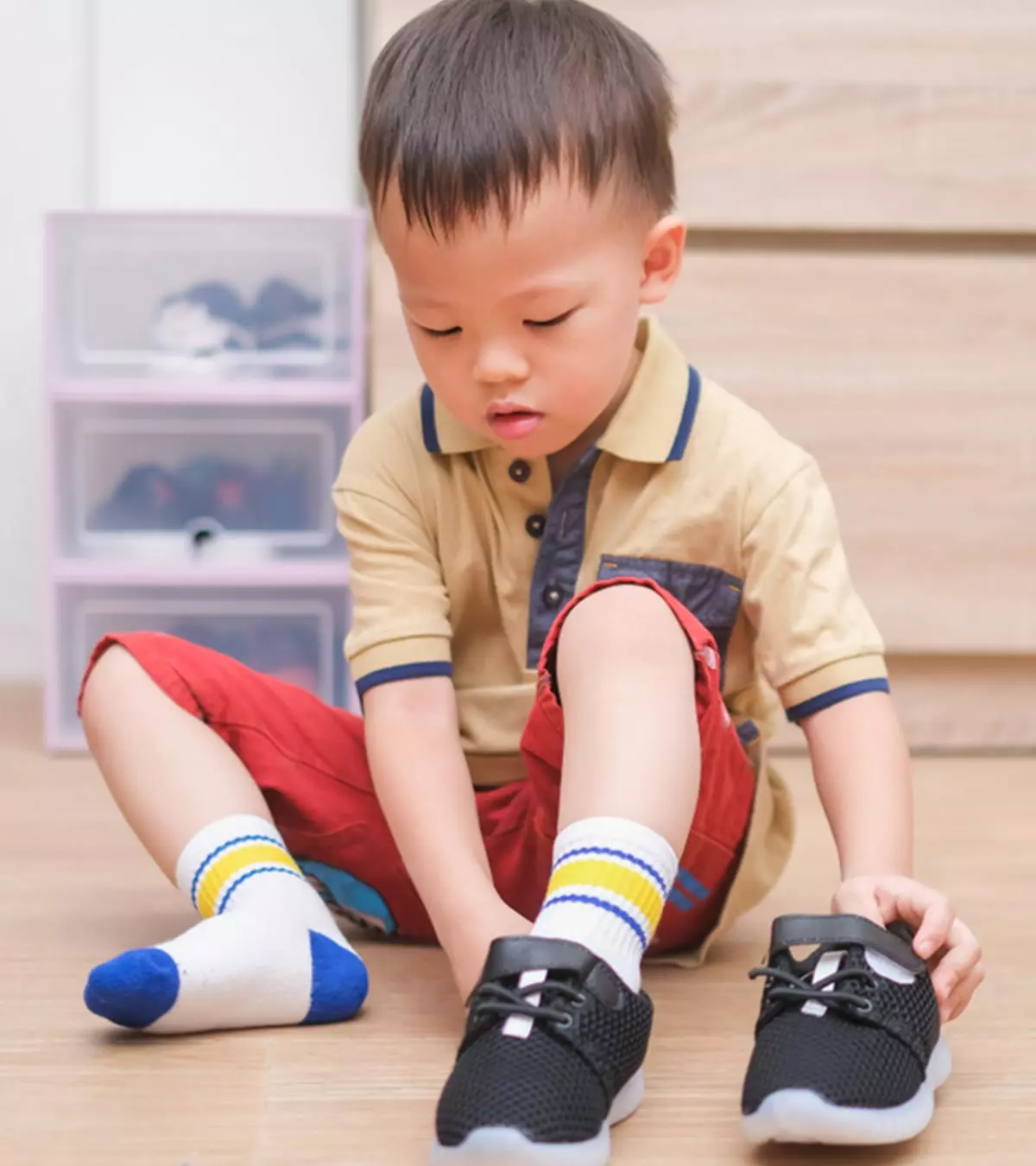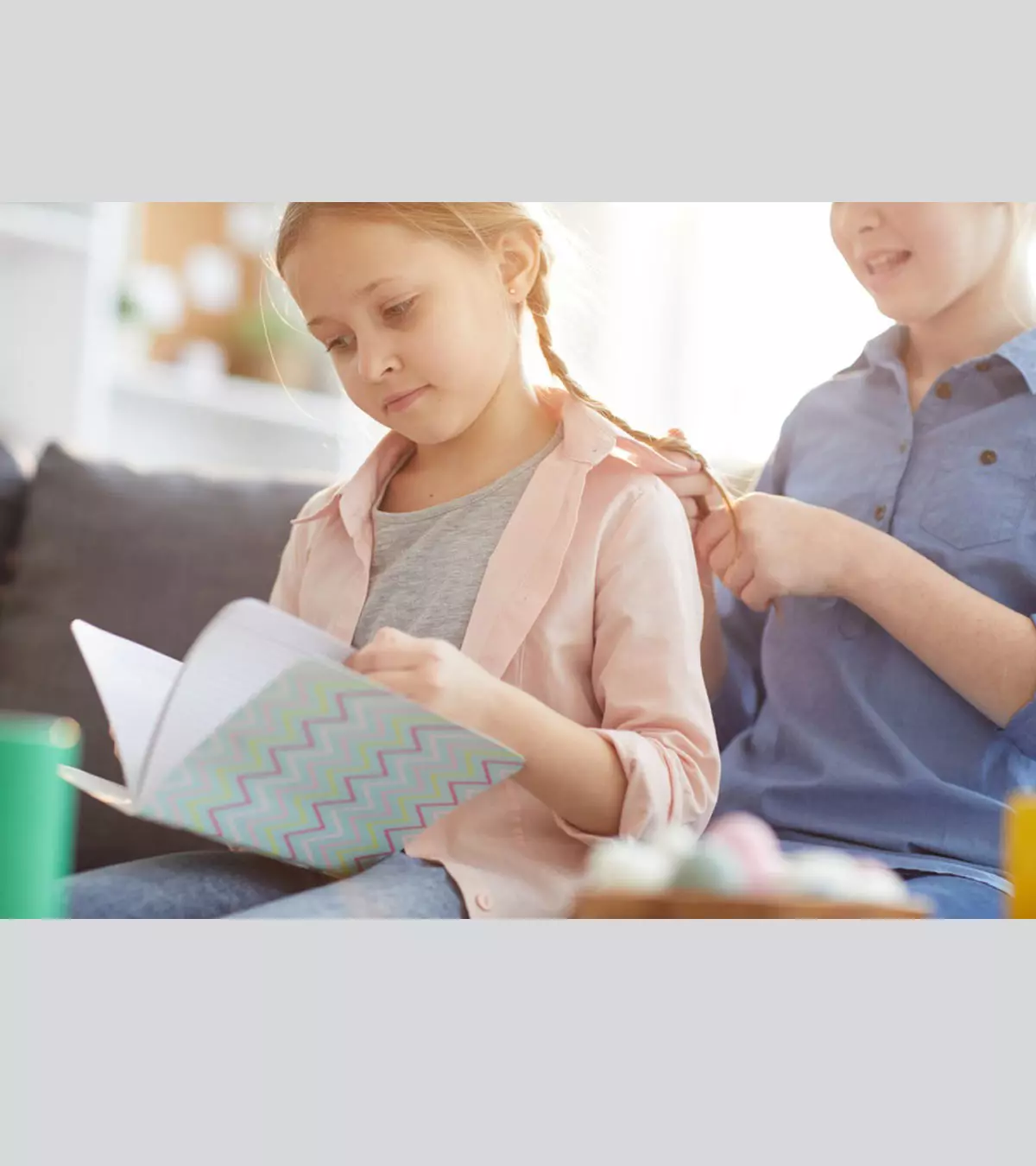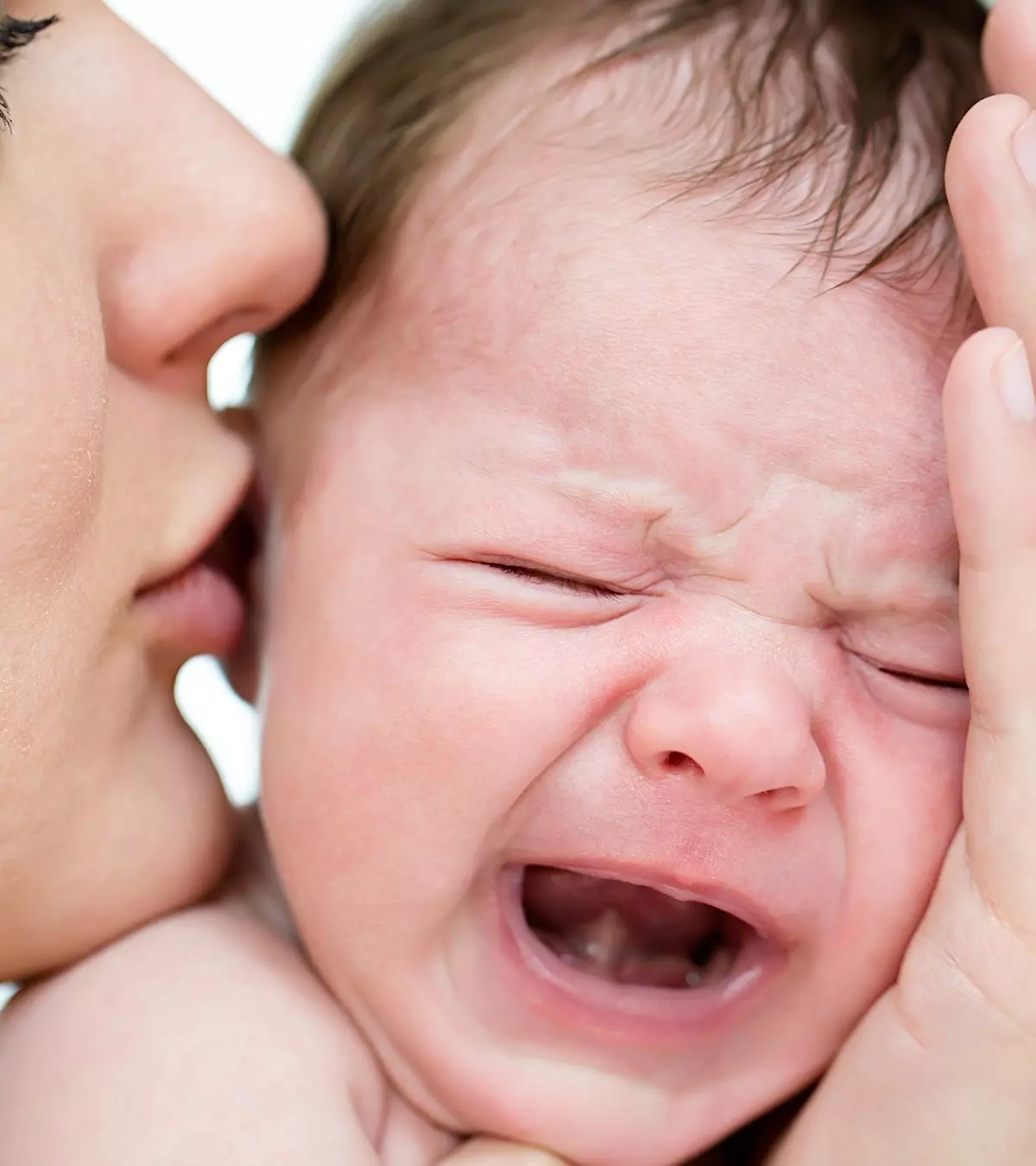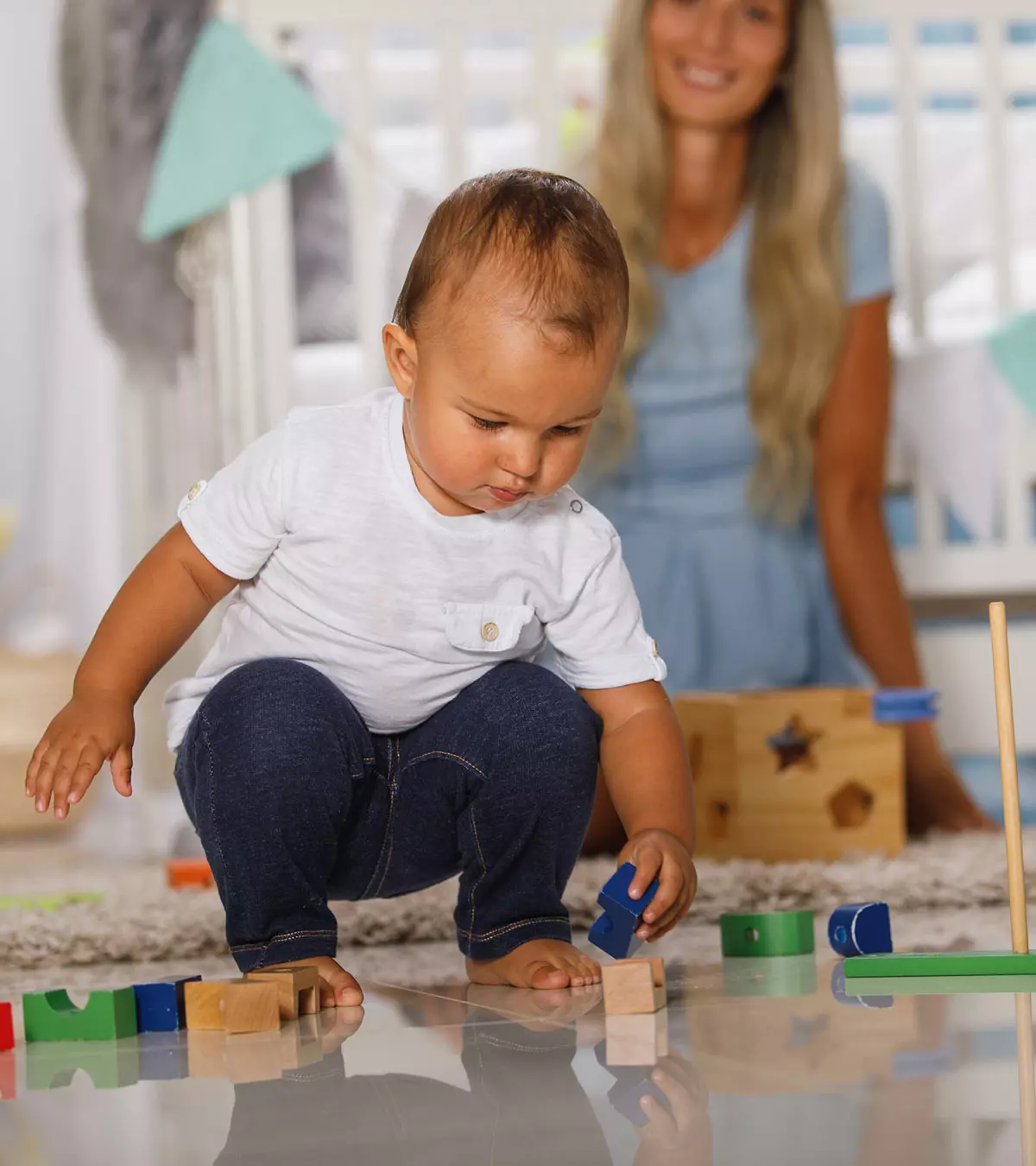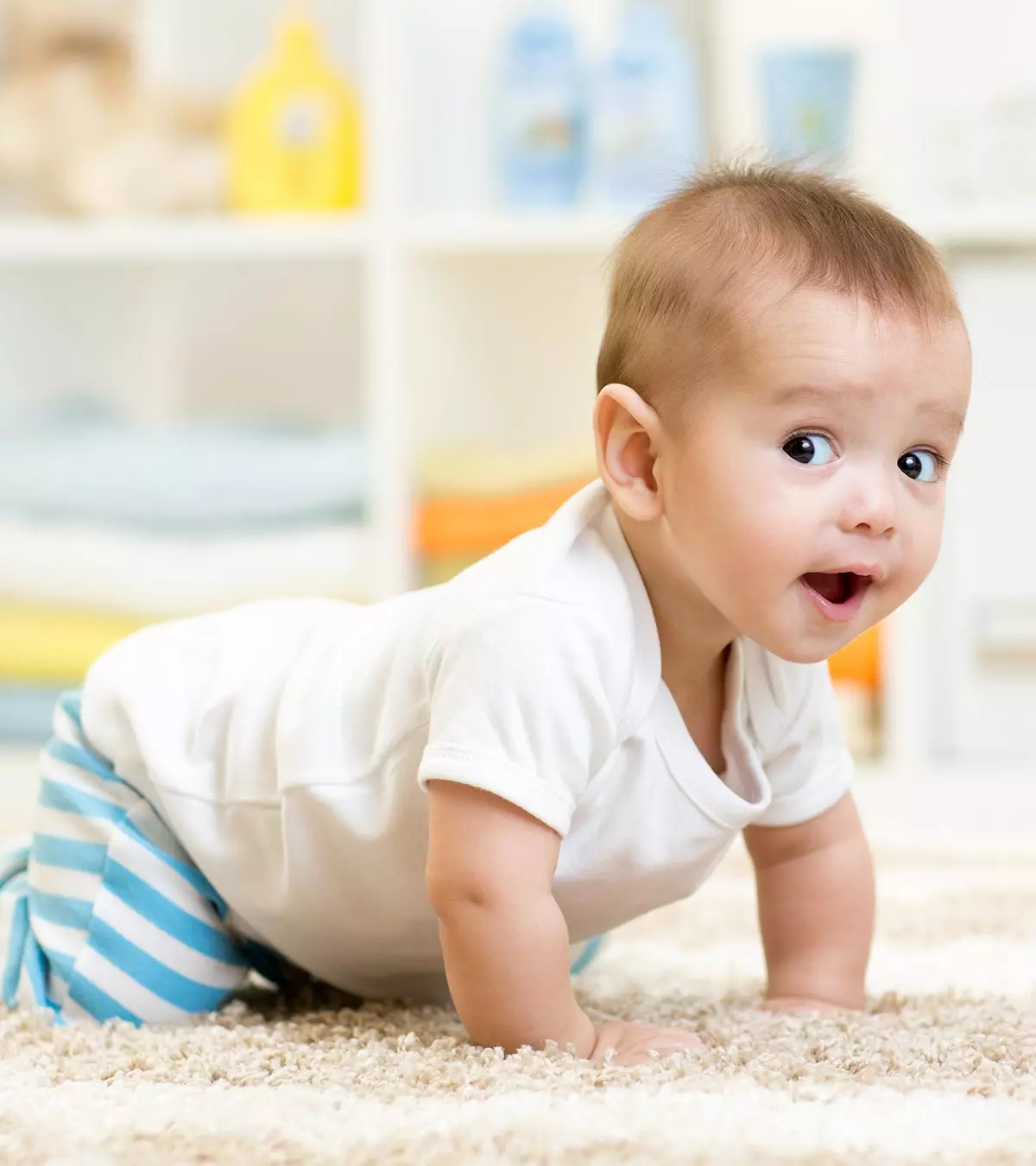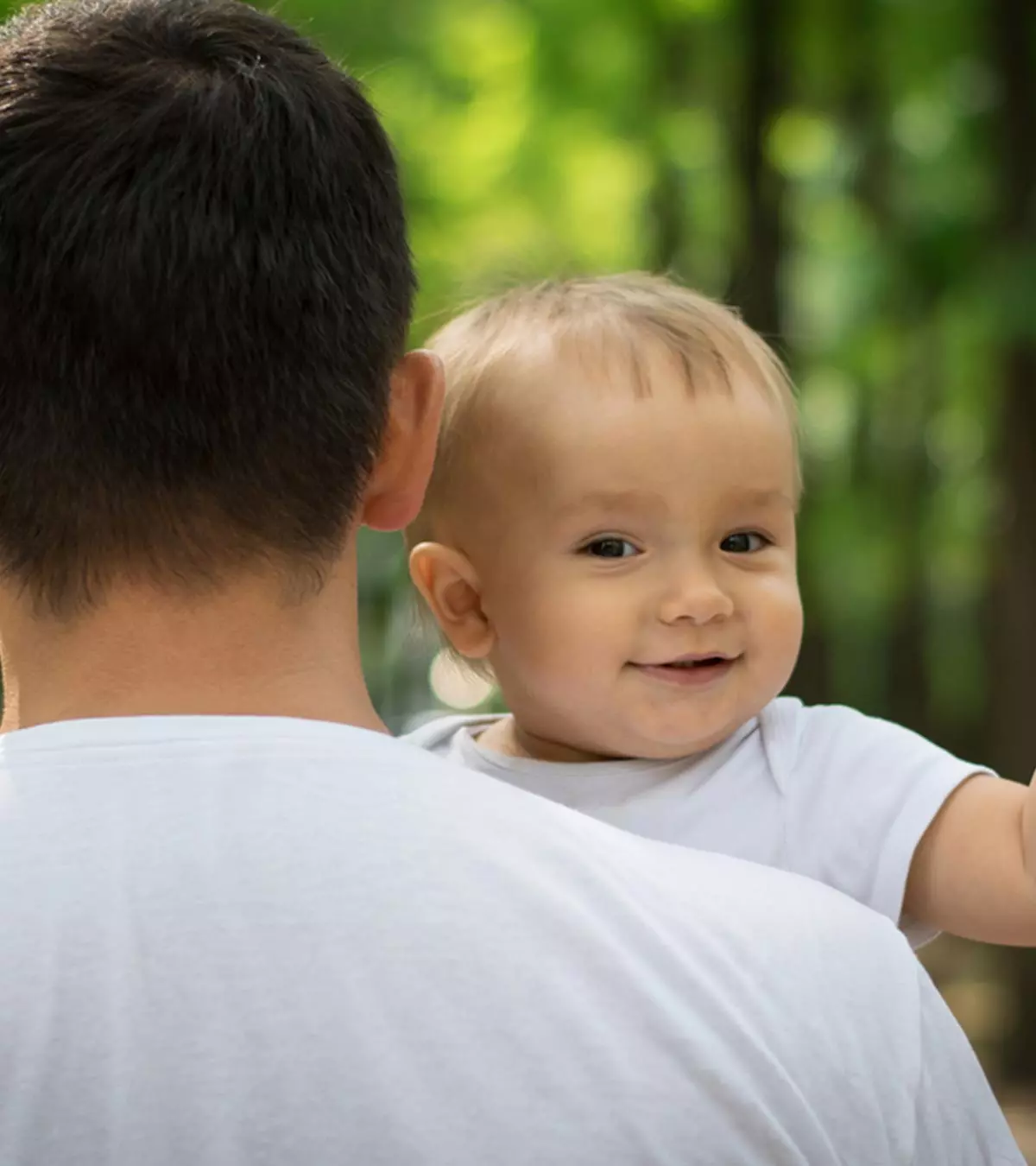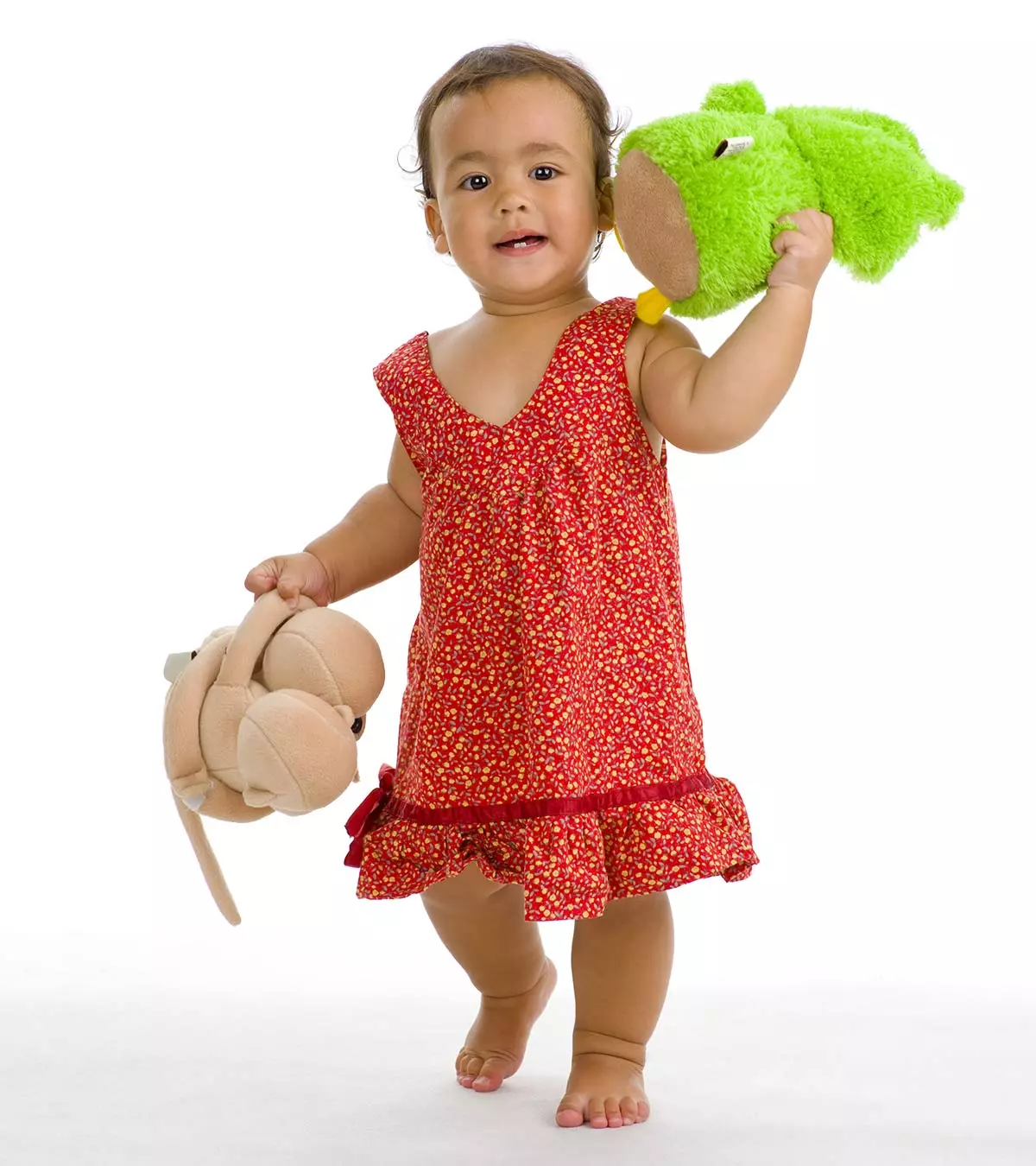
Image: ShutterStock
Weight and height aren’t the only indicators of a baby’s growth and development. The skills babies develop as they progress each month, referred to as developmental milestones, and includes motor, and social interactions that mark their growth and development. For example, you may notice that by your baby’s 21st month, when they are just a few months away from turning two, they understand a few terms and how to use some objects.

Continue reading to learn more about the 21-month-old milestones, encompassing the developmental achievements that most babies reach during this stage.
Key Pointers
- 21-month-old babies have developed motor skills including climbing, running, and walking, as well as fine motor skills like scribbling and handling small items.
- They have also acquired cognitive abilities such as reasoning, thinking, and operating toy buttons.
- In terms of language, they have improved and can now use two to three word sentences and recognize body parts, objects, and people.
- Emotional and social abilities have also developed as they imitate others, engage with other children, and experience less separation anxiety.
- To support their babies’ development, parents should provide a safe environment and encourage play and social interaction with others.
21-Month-Old Baby Development
There is nothing to worry about if your baby has not attained some milestones that are mentioned in the development charts. Every child is different, and it is best to let them develop at their own pace. While some babies remain ahead of the milestones, others reach them a little later. Each of these situations is perfectly normal. As your little one enters their 21st month, they are developing rapidly and exploring and learning new things daily with curiosity. As a parent, it is essential to support and guide them through this stage of development. Get to know the 21-month-old developmental milestones (1):
1. Development of motor skills
Some of the gross motor skills that your baby has developed by this age are as follows:
- Capable of climbing up and down the stairs, running and walking.
- Able to walk alone, carry a toy with him while walking and start running as well.
- Able to kick a ball now.
- Able to climb furniture and walk up and down the stairs.
2. Development of fine motor skills
Your baby
has now developed some fine motor skills. Take a look below:
- Scribble without help. For instance, hold a pencil using thumb and fingers (Pincer grasp)
Mumtaz, a mother of two and YouTuber, says her children enjoy coloring using crayons, and she noticed improvement in their fine motor skills at 21 months. She says, “Though they won’t be able to color within the object, allowing them to hold a crayon and color will surely improve their grip (i).”
 Point to consider
Point to consider- Turn over a container.
- Use one of the hands more than the other at this stage.
3. Development Of Cognitive Skills:
Some of the cognitive skills that your baby has developed at this stage are as follows (2):
- Reasoning and thinking skills with the help of five senses.
- Engage in turn talking.
- Using buttons and switches on a toy.
- Aware of the use of different objects like cabinets and drawers.
4. Development of language skills
Your child’s language skills are improving rapidly, and they may be able to understand and use more words. Therefore, it is crucial to encourage language acquisition by talking to them, reading books, and singing songs. Your baby has started developing language after the first birthday. By this time your baby shall be able to speak different words (2).
- Recognize body parts, objects and people.
- Use simple phrases– give basically two word sentences and two or three sentences.
- Follow simple instructions and can also point to similar objects.
Sharing her thoughts on a 21-month-old child’s language development, she says, “A child at this age says ‘No’ a lot. Therefore, avoid using negative sentences around your child. Instead, try rephrasing your requests around them. So instead of saying ‘Don’t shout,’ say ‘Be polite.’”
 Research finds
Research finds5. Emotional and social skills
Now that your baby enjoys the company of other children and loves playing with them, it is another developmental milestone (3).
- At this age your baby has started imitating others and considers themselves as a separate individual. Social interaction with other children starts. Your child is becoming more social and may enjoy playing with other children. Encourage socialization by arranging playdates and taking them to social events.
- This age marks the beginning of new found independence and also shows decreasing signs of separation anxiety.
- They also start imagining and creating by indulging in pretend play.
6. Sleep schedule for 21-month-old
According to the CDC, children under 12 to 24 months need to sleep for a minimum of 11 to 14 hours, including their regular naps (4). Parents can consider the following sleep schedule for their babies to ensure proper health benefits.
- Nighttime sleep: It’s common for them to sleep for 10-12 hours at night.
- Daytime naps: A one to two-hour nap during the day is typical.
- Afternoon nap: It shouldn’t exceed two hours, and usually prevents late-night sleepiness.
- Evening bedtime: Bedtime routines often should begin around 7 pm, with children generally ready to sleep between 7:30 and 8 pm.
- Consistent routine: A consistent sleep schedule, even on weekends, is advantageous.
- Settling challenges: It’s normal for some toddlers to challenge bedtime boundaries or wake up during the night as part of their developmental process.
Coping With Your Baby’s Tantrums During 21 Months Development
The best thing that you can do is to keep your cool while they throw temper tantrums.
- You must stay close to them and wait till they vent out frustrations.
- Lend them a shoulder to cry or hug them to feel better. You can also distract them with toys that they love.
- Your child may be teething, which can cause discomfort and irritability. Provide them with teething toys and cool and soft foods to soothe their gums.
- Don’t show anger and speak to them in a calm and composed tone.
 Point to consider
Point to consider- Asserting their will is a part of their growing up process. But make sure you don’t give in to their demands.
- You may find them insisting on doing things that they have been asked not to. Make sure to be around when they show self harming behaviors such as hitting their head or any other body parts on the floor in a fit of temper.
- Some children may experience sleep regression due to various reasons. Creating a consistent bedtime routine can help them sleep better.
- Distracting them by taking them outside or inside, or showing them something interesting will help you subside their tantrums.
Frequently Asked Questions
1. Is it normal for a 21-month-old to not talk?
Yes. Your child may be a late talker which means the toddler understands language, has developed play skills, movement, thinking, and social skills, but uses very few words for their age. They should have fulfilled certain points such as:
2. How much does a 21-month-old understand?
At this age, toddlers will understand the concept of ‘mine’ and simple instructions such as ‘bring it to mum’ or ‘let’s go for a walk’. They may also start following two-step instructions (3) (9).
3. Does TV cause speech delay in a 21-month-old baby?
Children younger than 22 months do not seem to learn new words by viewing child-directed TV programs, and learning was found more effective in their natural environment. TV or screen exposure is thought to create stimuli that are absorbed but do not have developmentally constructive effects. This may affect brain development related to achieving language skills. Judicious use of screen time may improve vocabulary and language skills in two-and-a-half-year-old or older children (10).
4. Can we punish a 21-month-old baby for bad behavior?
Physical punishment or angry/abusive words should never be used against children. Toddlers of this age are susceptible to the fear of separation, and a “time-out” may be detrimental. They are not mature enough to understand consequences or verbal prohibitions. Moving the child from the place where they’re showing bad behavior and using a strict “No” may be appropriate at this age (11).
5. When do babies say their first word?
Up to the age of 5 months, the baby may only coo and make different sounds to signify pleasure or irritation. But they may start to babble and say their first words like “mama” or “dada” between the ages of six and nine months. They may also try to mimic the sounds you make (14).
6. Is not talking a sign of language disorder in a 21-month-old baby?
Not talking at 21 months old may be a sign of a language disorder, but it is not necessarily a definitive indicator (15). Every child develops at their own pace; some children may start speaking later than others. However, if a child is not making any attempts to communicate, is not responding to their name, or has a significant delay in their speech development compared to their peers, it may be worth discussing with their pediatrician.
A baby’s growth and development are indicated by the milestones they achieve by a certain age. Your baby’s 21st month will be filled with many new experiences. Their motor skills will improve, and they will now be able to walk, run, kick, or climb. Babies will also develop better cognitive skills, allowing them to reason and think more logically. They will start using simple phrases and following instructions. By now, they will also indulge in pretend plays and display independence. However, at this age, babies will start to throw more tantrums. Staying calm and showering them with love can help you control their tantrums. It is important to remember that although every age marks some milestones, all children are different, and so are their abilities. So, do not compare your children with others as they grow to become 22-month-olds. A 22-month-old’s development depends on the nutrition and care they receive in the previous months. Therefore, nurture your little one with proper nutrition and enough sleep. Provide them enough time to achieve these milestones while on their path to healthy growth.
Infographic: Major Developmental Milestones Of A 21-Month-Old Toddler
Your 21-month-old will be more active and independent than in the previous months and more eager to explore things and places around them. The following infographic presents some major milestones you may expect from your little one at this developmental stage. You may share it with parents of other toddlers too.

Illustration: Momjunction Design Team
Illustration: 21 Month Old Baby Developmental Milestones

Image: Stable Diffusion/MomJunction Design Team
Personal Experience: Source
MomJunction articles include first-hand experiences to provide you with better insights through real-life narratives. Here are the sources of personal accounts referenced in this article.
i. 21 month old toddler growth development and day activities;https://www.youtube.com/watch?v=lGEDaDLc_rA
References
- Developmental milestones 18 to 24 months.
https://www.childrensmn.org/educationmaterials/childrensmn/article/15315/developmental-milestones-18-to-24-months/ - Important milestones: Your child by two years.
https://www.cdc.gov/ncbddd/actearly/milestones/milestones-2yr.html - 18-24 months: toddler development.
https://raisingchildren.net.au/toddlers/development/development-tracker-1-3-years/18-24-months - About Sleep.
https://www.cdc.gov/sleep/about/?CDC_AAref_Val=https://www.cdc.gov/sleep/about_sleep/how_much_sleep.html - Tantrums: why they happen and how to respond.
https://raisingchildren.net.au/toddlers/behaviour/crying-tantrums/tantrums - Toddler tantrums: the facts and how to cope.
https://www.zerotothree.org/resource/12-24-months-social-emotional-development - How to Tell if Your Child is a Late Talker – And What to Do about It.
https://www.hanen.org/information-tips/how-to-tell-if-your-child-is-a-late-talker - Speech and Language Delay.
https://familydoctor.org/condition/speech-and-language-delay/ - Your toddler’s developmental milestones at 2 years.
https://www.unicef.org/parenting/child-development/your-toddlers-developmental-milestones-2-years#language-and-communication - Nazeera F. Karani et al.; (2025); The influence of screen time on children’s language development: A scoping review.
https://www.ncbi.nlm.nih.gov/pmc/articles/PMC8905397/#CIT0020 - Effective discipline for children.
https://www.ncbi.nlm.nih.gov/pmc/articles/PMC2719514/ - Sudha Arunachalam et al.;(2013);Out of sight but not out of mind: 21-month-olds use syntactic information to learn verbs even in the absence of a corresponding event.
https://blogs.bu.edu/sarunach/files/2013/03/AEHW_preproof.pdf - Tips for Using Ignoring.
https://www.cdc.gov/parenting-toddlers/discipline-consequences/ignoring.html - Age-Appropriate Speech and Language Milestones
https://www.stanfordchildrens.org/en/topic/default?id=age-appropriate-speech-and-language-milestones-90-P02170 - Language Delays in Toddlers: Information for Parents
https://www.healthychildren.org/English/ages-stages/toddler/Pages/language-delay.aspx
Community Experiences
Join the conversation and become a part of our nurturing community! Share your stories, experiences, and insights to connect with fellow parents.
Read full bio of Dr. Mubina Agboatwalla
Read full bio of Jessica Albert
Read full bio of Rohit Garoo
Read full bio of Vibha Navarathna






